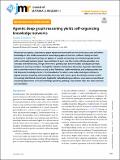Agentic deep graph reasoning yields self-organizing knowledge networks
Author(s)
Buehler, Markus J.
Download43578_2025_Article_1652.pdf (5.625Mb)
Publisher with Creative Commons License
Publisher with Creative Commons License
Creative Commons Attribution
Terms of use
Metadata
Show full item recordAbstract
We present an agentic, autonomous graph expansion framework that iteratively structures and refines knowledge in situ. Unlike conventional knowledge graph construction methods relying on static extraction or single-pass learning, our approach couples a reasoning-native large language model with a continually updated graph representation. At each step, the system actively generates new concepts and relationships, merges them into a global graph, and formulates subsequent prompts based on its evolving structure. Through this feedback-driven loop, the model organizes information into a scale-free network characterized by hub formation, stable modularity, and bridging nodes that link disparate knowledge clusters. Over hundreds of iterations, new nodes and edges continue to appear without saturating, while centrality measures and shortest path distributions evolve to yield increasingly distributed connectivity. Applied to materials design problems, we present compositional reasoning experiments to foster knowledge synthesis, yielding cross-domain ideas that transcend rote summarization.
Date issued
2025-07-31Department
Massachusetts Institute of Technology. Laboratory for Atomistic and Molecular Mechanics; Massachusetts Institute of Technology. Center for Computational Science and Engineering; MIT Schwarzmann College of ComputingJournal
Journal of Materials Research
Publisher
Springer International Publishing
Citation
Buehler, M.J. Agentic deep graph reasoning yields self-organizing knowledge networks. J. Mater. Res. 40, 2204–2242 (2025).
Version: Final published version